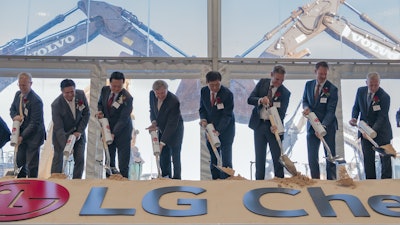
LG Chem has aspirations of building a production hub for the global battery material market in the United States. Those efforts finally put shovels to dirt this week as the battery maker started construction of a new cathode plant in Clarksville, Tennessee. The factory will make cathode materials specifically designed for North American electric vehicles (EVs).
LG Chem will invest some $1.6 billion to build the cathode plant, which is slated to have an annual capacity of 60,000 tons. The factory is the first phase of a $3.2 billion project set upon a little more than 420 acres in the Volunteer State.
According to the company, the factory will be America's largest cathode material facility. LG Chem hopes the plant can one day produce enough cathode materials for some 600,000 EVs with a range of more than 300 miles annually.
Most Read on IEN:
- Podcast: Tesla Recalls; Ford Cuts Lightning Production; Hasbro Layoffs
- Storied U.S. Steel to Be Acquired for More than $14 Billion by Nippon Steel
- Insect Shield Accused of Falsifying Army Uniform Testing
- Teamsters Vote to Authorize Strike at Anheuser-Busch
- Nikola Founder Convicted for Exaggerating Claims of Zero-Emission Trucks
Mass production of NCMA (Nickel, Cobalt, Manganese, Aluminum) cathode materials is scheduled to begin in 2026. However, the company plans to diversify its product portfolio through future-generation cathode material products and expand production capacity in response to increasing demand.
LG Chem previously signed a comprehensive agreement for the long-term supply of 950,000 tons of cathode materials with General Motors (GM) last year and a North American cathode material supply contract worth $2.5 billion with Toyota in October this year.
According to the company, the site in Tennessee was selected in part due to its geographical accessibility for customer deliveries and raw material imports. LG Chem plans to use the facility as a base for customer communication, producing customized cathode materials optimized for EVs from the development stage. The plant will also secure a reliable supply chain for minerals and precursors from nations with U.S. free trade agreements (FTAs). For example, it will use precursors from Ulsan by Korea Precursor Company (KPC), a joint venture of LG Chem and Korea Zinc.
LG Chem envisions the plant securing the world's highest-level annual production capacity of 10,000 tons per line. The company will also apply smart factory technology, automating production and establishing a quality analysis and control system.
The company is currently discussing material supply cooperation with U.S. battery recycling companies. LG Chem hopes to operate the plant with 100% renewable energy, including solar and hydropower, in collaboration with local power supply companies.
The groundbreaking ceremony yesterday was attended by Tennessee Governor Bill Lee, Commissioner Stuart McWhorter, Senator Marsha Blackburn, Korean Ambassador to the United States Cho Hyun-dong, Clarksville City Mayor Joe Pitts and Montgomery County Mayor Wes Golden. Key attendees from LG Chem were CEO Shin Hak-cheol, President of Advanced Materials Company Nam Chul and Head of Battery Materials Business Unit Lee Hyang-mok.






















